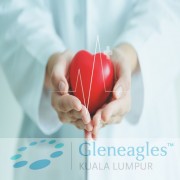How Aware Are We On Screening for Heart Disease?
How aware is the general public about the need to get screened for heart disease?

Heart disease has been and remains one of the major causes of death in Malaysia. Despite major advances in healthcare and awareness, the number of patients with heart disease increases every year.
Malaysians are getting more aware about healthy lifestyle and keeping active in physical sports which is good for the heart. However, compared to our neighbouring countries and developed countries, we, Malaysians are still getting heart diseases at a younger age. The average age of those with heart diseases in Malaysia was 58, whereas in Singapore was 61, Thailand 68, China 63, United States 66 and Canada 68.
The awareness for health screening, especially for heart disease, is increasing but more effort is needed. Although the average age for getting heart disease in Malaysia is 58 years, we have seen about 8% of patients having acute coronary syndrome (ACS) below the age of 40 years (based from our local database NCVD-ACS 2016-2017).
Furthermore, majority of patients with ACS will have cardiac risk factors such as hypertension (63%), diabetes mellitus (45%) and dyslipidemia (37%) and all of these need to be addressed adequately.
Therefore, it is important for everyone to know and understand their individual cardiac risk profile and for these risk factors for these risk factors to be addressed appropriately. So, go and have your health screening done to make sure you remain healthy.
What are the symptoms of heart disease that the public need to be aware of?
Patient will usually complain of chest discomfort especially on exertion. Chest discomfort can mean heaviness, chest pain, an uncomfortable sensation or sometimes even gastric-like symptoms. This will usually last for a few minutes and diminishes after resting.
Commonly, chest discomfort occurs on the left side which may radiate to the left arm or jaw. Some patients may have central chest discomfort which makes it difficult to differentiate between cardiac pain and gastric pain. Shortness of breath is also a common symptom in which you tend to get tired easily.
If you have sudden chest pains which is relentless in nature and getting worse, associated with sweating, please go and seek help immediately as this can be one of the signs for heart attack.
Why does heart disease result in increased complications for Covid-19 patients?
Although the majority of COVID-19 patients (about 80% if based on reports from China) are asymptomatic, 20% may developed a more serious symptoms including severe pneumonia and a quarter will require ICU-level care.
Covid-19 patients with pre-existing heart disease may suffer a heart attack or develop congestive heart failure. The rapid worsening of cardiovascular health can be due to various factors: -
- Patients who have pre-exiting heart disease usually have other underlying medical conditions such as diabetes mellitus, hypertension and obesity and generally will be in a higher risk group for worsening symptoms.
- The viral infection itself with lung infection may cause an imbalance of supply (with lower circulating oxygen levels) and with increased demand of oxygen (fever causes rapid heart rates, for example). This will lead to chest pains and shortness of breath.
- Inflammation process – Inflammation is the normal and critical body’s immune response to infection. However, in some COVID-19 patients, a heightened immune response may increase the risk of heart attacks and also making the blood more prone to clotting.
- Inflammation of the heart – Some COVID-19 patients may appear to have symptoms of heart attack but is actually suffering from marked inflammation of the heart called myocarditis. The heart muscle may become weak which may cause the blood pressure to be low and dangerous heart rhythm may occur.
Treatment for cardiovascular disease has certainly become more challenging in view of COVID-19 but we continue to resume our work with caution (and adequate PPE) and resolve through shared knowledge and humility.
Material was provided by Dr. Al Fazir Omar Cardiology specilist at Gleneagles
Related Articles
“Tidal wave” of cancer predicted
WHO predicts doubling of annual cancer cases by year 2034
Read moreYou Ask, They Answer: Opioid Addiction
Patients with personality disorders, depression, anxiety or a history of alcohol or drug abuse are at high risk of opioid addiction
Read moreWorried about medical bills?
Mount Elizabeth Hospitals says patients can obtain a clear breakdown of their medical bills beforehand along with the coverage of several insurance options
Read moreLatest Articles
Medical Care
Clinical Exercise Physiologist (CEP): The Emerging of Exercise is Medicine
How Exercising can be a Medicine
Read moreMedical Care
Reversing type 2 Diabetes: Embracing Hope and Determination
Experience the remarkable journey of Ash and his grandfather Atok as they conquer type 2 diabetes through unconventional methods, showcasing the power of love and determination over adversity.
Read moreMedical Care
Bladder Cancer: What You Need to Know
Empower yourself with our comprehensive guide to bladder cancer. Explore symptoms, diagnosis, treatments, and supportive resources to safeguard your health.
Read more